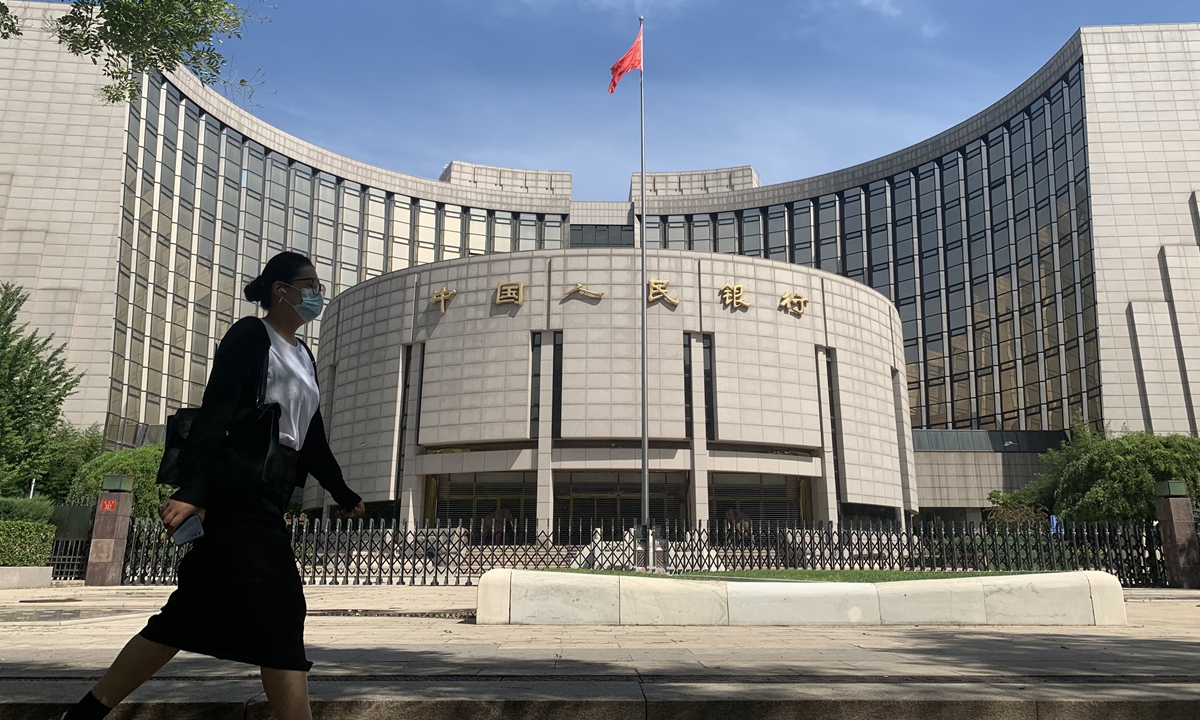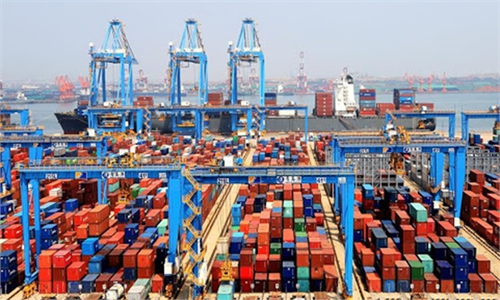Financial regulators to implement macro policies precisely in response to economic situation: Chinese central bank governor

A view of the PBC building in Beijing Photo: VCG
China's financial regulators will implement macro moves in a "precise and forceful" manner in response to the economic situation, the central bank governor said, as part of the country's broader efforts to bolster market confidence and strengthen the recovery momentum of the world's second-largest economy.The financial work report, which covers policies involving multiple economic sectors, delivered by Pan Gongsheng, the governor of the People's Bank of China (PBC), to the sixth session of the Standing Committee of the 14th National People's Congress (NPC) on Saturday, sent a clear and reassuring signal to the markets about the resolution and concrete measures that Chinese authorities will take to stabilize economic growth, which is conducive to enhancing market expectations and boosting morale, industry observers told the Global Times.
The report, covering the period since the fourth quarter of last year, outlined the priorities of the central bank, ranging from the implementation of monetary policy, financial regulations and support for the real economy, to financial reform and opening-up, according to the PBC's official website.
Specifically, the report emphasized the reduction of interest rates, expanding investment in key areas, helping to solve the problems in the real estate market and local government debts, strengthening supervision and anti-corruption work, stepping up a crackdown on illegal financial activities, and further deepening the reform of financial institutions.
"It's a comprehensive review and summary of the financial work since late last year, reflecting the tone of making progress while maintaining stability," Dong Shaopeng, a senior research fellow at the Chongyang Institute for Financial Studies at Renmin University of China, told the Global Times on Saturday.
The report will help the top legislature's supervision of financial work, improve its transparency, and enhance market confidence in China's financial supervision, according to Dong.
Regarding upcoming work priorities, Pan said that China will continue to deepen the market-based reform of interest rates, release the dividends of loan prime rate (LPR) reform, further encourage financial institutions to reduce real lending rates, and reduce comprehensive credit costs for businesses and individuals.
So far this year, China's one-year LPR has been lowered by 20 basis points (bps) and five-year LPRs by 10 bps to shore up economic growth. The latest cut came in August when the one-year LPR was moved to 3.45 percent, down from 3.55 percent, while the five-year-plus rate, on which lenders base their mortgage rates, remained unchanged at 4.2 percent.
Market observers said the possibility of further rate cuts can't be ruled out for the rest of the year.
To promote the property market's stabilization and recovery, it may be necessary to cut interest rates for new mortgages further, Wang Qing, chief macroeconomic analyst at Golden Credit Rating International, told the Global Times.
Wang said the five-year-plus LPR could be cut by 30-40 basis points.
In the report, Pan said that the PBC will further promote the implementation of policies to activate the capital market and boost investor confidence.
In August, China halved the 0.1 percent stamp duty on stock transactions to boost the securities market.
Pan said that China will resolve the default risk of bonds of big property firms, averting risk contagion in the stock, bond and foreign exchange markets.
"The financial policy directions as seen in Pan's work report, coupled with recent targeted and substantive measures rolled out by the Chinese authorities, sent a positive signal for the market. This will greatly boost morale at a point when China is making all-out efforts to tackle downward headwinds," Tian Yun, a veteran economist based in Beijing, told the Global Times on Saturday.
It will take time to see if the measures, especially those rolled out after a key top leadership meeting in July, have been implemented effectively and gained market acceptance, Tian said.
After a steady shift for the better in epidemic prevention and control, China's economic recovery has been progressing with twists and turns. The economy has tremendous resilience and potential for development, and its long-term sound fundamentals remain unchanged, according to the Political Bureau of the Communist Party of China (CPC) Central Committee meeting.
Consumption could play a larger role in boosting the economic rebound in the fourth quarter, and relevant support measures are expected, Tian added.
China's third-quarter GDP growth came in stronger than expected, rising 4.9 percent from a year earlier.
In the first three quarters, retail sales reached 34.21 trillion yuan ($4.68 trillion), up 6.8 percent year-on-year. Consumption expenditure contributed 83.2 percent to overall economic growth, according to the National Bureau of Statistics.




